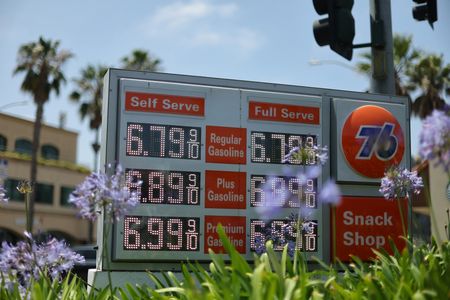
By Trevor Hunnicutt and Jarrett Renshaw
WASHINGTON (Reuters) – U.S. President Joe Biden on Wednesday demanded oil refining companies explain why they are not putting more gasoline on the market, sharply escalating his rhetoric against industry as he faces pressure over rising prices.
Biden wrote to executives from Marathon Petroleum Corp , Valero Energy Corp and Exxon Mobil Corp and complained they had cut back on oil refining to pad their profits, according to a copy of the letter https://docsend.com/view/qpg3e8a2s3fbxi3a seen by Reuters.
The letter is also being sent to Phillips 66, Chevron Corp, BP and Shell, a White House official, who declined to be identified, told Reuters.
“At a time of war, refinery profit margins well above normal being passed directly onto American families are not acceptable,” Biden wrote, adding the lack of refining was driving gas prices up faster than oil prices.
U.S. energy companies are enjoying bumper profits as the Russian invasion of Ukraine has added to a supply squeeze which has driven crude oil prices above $100 a barrel, and as fuel demand has remained robust, despite record high gasoline prices.
U.S. refining capacity peaked in April 2020 at just under 19 million barrels per day (bpd), as refiners shut several unprofitable facilities during the coronavirus pandemic. As of March, refining capacity was 17.9 million bpd, but there have been other closures announced since.
U.S. refiners are running at near-peak levels to process fuel – currently at 94% of capacity – and say there is little they can do to satisfy Biden’s demands.
“Our refineries are running full out,” Bruce Niemeyer, corporate vice president of strategy and sustainability at Chevron, told Reuters on the sidelines of a New York energy transition conference on Tuesday, before Biden’s letter was made public.
Biden said the industry’s lack of action is blunting the administration’s attempts to offset the impact of oil-rich Russia’s invasion of Ukraine, such as releases from the nation’s oil reserves and adding more cheaper ethanol to gasoline.
On Friday, the president accused the U.S. oil industry, and Exxon Mobil Corp XOM.N in particular, of capitalizing on a supply shortage to fatten profits after a report showed .nL1N2XY03V
INFLATION WOES
Biden has been intensifying attacks against oil companies as gas pump prices race to record highs above $5 per gallon and inflation surges to a 40-year record. [nL1N2XX1VP]
Privately, White House officials have been reaching out to refiners to inquire about idled plants and spare capacity and whether there are other ways to increase gasoline supply, according to two sources familiar with the discussions.
Rising gas prices have helped drive unexpectedly persistent consumer price inflation and voter anger before Nov. 8 midterm elections where Biden’s Democratic Party is defending its control of Congress.
U.S. consumer inflation unexpectedly accelerated in May, leading to the largest annual increase in four decades. White House officials have hotly debated how to respond to a problem they once thought would fade and now see as largely out of their control.
Biden has attributed rising oil prices primarily to U.S.-led sanctions that took Russian energy supplies off the global market after its invasion of Ukraine.
But he has also taken the fight to major oil companies, which are riding rising energy prices to record earnings, and giving those profits to investors rather than spending on new drilling and refining capacity.
“Exxon made more money than God this year,” Biden said last week.
Exxon’s first quarter profit doubled from the previous year’s to $5.48 billion, and the major told investors it would increase share buybacks.
U.S. Energy Secretary Jennifer Granholm plans to host an emergency meeting on how refiners can respond to higher prices, Biden said, asking for a response from the oil companies beforehand.
She said they should provide “concrete ideas” to increase oil refining along with an explanation for why they may have cut such capacity in the last two years.
“We’re on a war footing,” Granholm said in an interview with MSNBC. “The price of oil and the price of gas is precipitating the high cost, the high percentage of inflation around the world.”
“We’re not against profit,” Granholm said, but added that when there is a 225% increase in profit year after year it means something else is going on.
(This story refiles to remove extraneous paragraph 10)
(Reporting by Trevor Hunnicutt, Jarrett Renshaw and David Gaffen; Editing by Chizu Nomiyama, Heather Timmons and Marguerita Choy)

